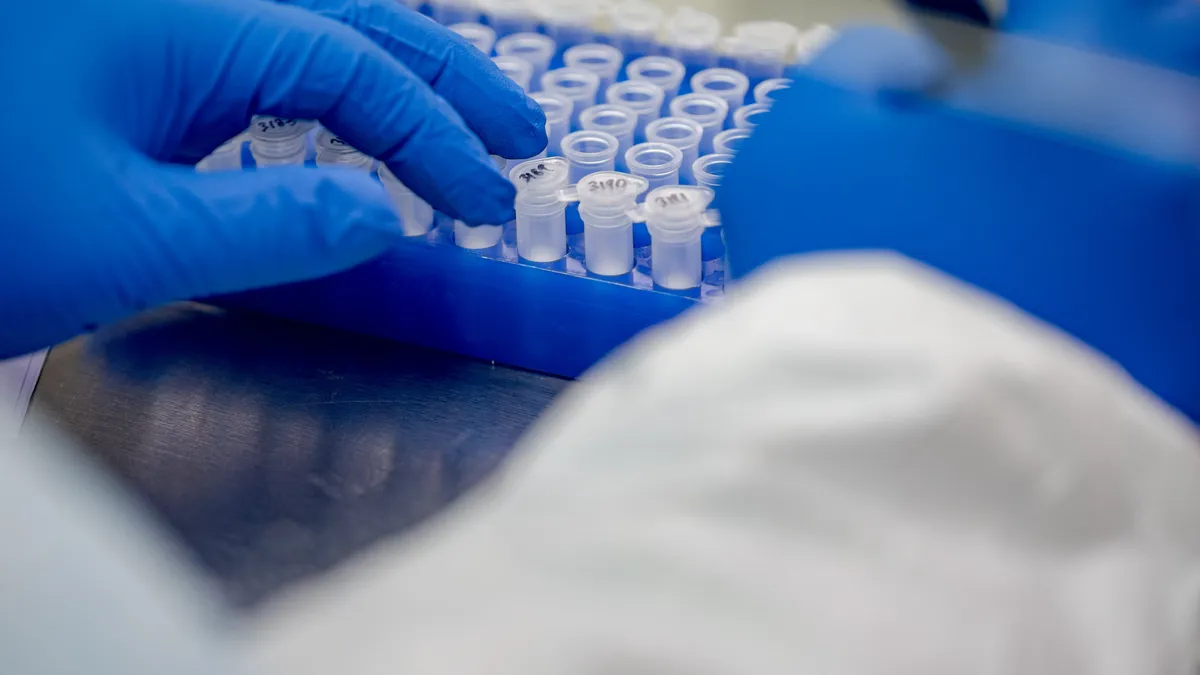Dive Brief:
- Quest Diagnostics on Wednesday reported first quarter revenues of $1.82 billion, down 3.7% from 2019. In particular, the company saw testing volumes decline by more than 40% during the last two weeks of March, CEO Steve Rusckowski told investors on Wednesday's earnings call. "We're definitely living in extraordinary times," he said. Quest withdrew its previous guidance for 2020 on March 31 due to uncertainties related to COVID-19.
- The company reported it has performed about 1 million COVID-19 molecular tests to date and late Tuesday announced it has begun conducting blood-based antibody testing aimed to detecting those who might be immune to the virus. Quest will initially provide the antibody service based on tests from Abbott and Euroimmun, a PerkinElmer company. But it is also pursuing other platforms to expand capacity.
- Quest rival LabCorp has been offering antibody tests on a limited basis to hospitals and healthcare systems since late March. LabCorp on Wednesday announced expansion of the testing to more provider organizations and expects to be able to perform several hundred thousand tests per week by mid-May. Quest's Rusckowski said its antibody testing capacity will reach more than 200,000 tests a day in the same timeframe.
Dive Insight:
Quest and LabCorp have been expanding COVID-19 testing availability amid growing demand for tests as the U.S. grapples with the public health crisis and looming reopening of the country. However, these commercial laboratories have been struggling to catch up with the backlog of coronavirus tests.
While Quest's volume of coronavirus testing is substantial, Rusckowski lamented to investors on Wednesday's call: "It is not nearly enough to offset the reductions we're seeing in the rest of our business." Although financial performance in January and February had a "strong" start, the company "began to see substantial declines" in its testing business in March, not just in hot spots such as New York City but across all U.S. metro markets following social distancing and shelter in place orders.
As a result, Quest has taken a number of actions to mitigate the negative impacts of COVID-19. Rusckowski's pay has been cut by 25%, with reductions for other salaried employees ranging from 5% to 20%; the company has suspended certain benefits such as the 401(k) match; reduced hours for employees whose work has significantly declined; and furloughed employees with diminished work who expressed interest.
Rusckowski added that in April testing volume declines "continued to intensify" but Quest is starting to see signs that the negative impact may be "bottoming out at around 50-60%." Nonetheless, he said the company is currently able to perform 50,000 tests per day while eliminating its backlog "with a current turnaround time of 1-2 days."
Quest is working with Walmart to provide drive-thru coronavirus testing services to those exhibiting symptoms as well as all healthcare workers and first responders, according to Rusckowski. "We're currently operating at approximately 10 sites in 5 states," he said, with plans to expand to 20 more locations by the end of April with no out-of-pocket costs for tests performed.
Rusckowski applauded the decision last week by the Centers for Medicare and Medicaid Services to double the Medicare reimbursement rate for high-throughput coronavirus molecular tests from about $51 to $100. "This is strong recognition of the vital role laboratories are playing to support the nation's response to the COVID-19 pandemic and we hope to see other payers follow CMS's lead," he added.
While applauding the Senate's passage Tuesday of the next round of emergency funding for the COVID-19 response including $25 billion for expanding and administering testing, he was uncertain of the potential benefit to Quest and other commercial labs.
The American Clinical Laboratory Association, whose members include Quest and LabCorp, also commended the Senate bill but is seeking "clarity on how the funding will be allocated to support hotspots and high-risk populations, as well as broader efforts to increase high throughput testing nationwide."
Rival LabCorp, which first made its COVID-19 test available in early March, will release its first quarter 2020 financial results on April 29.
FDA announced Tuesday its first emergency use authorization for a coronavirus diagnostic test with an at-home sample collection option. The agency re-issued an EUA for LabCorp's COVID-19 molecular test to permit testing of self-swabbed nasal specimens by individuals using the company's home collection service called Pixel.











